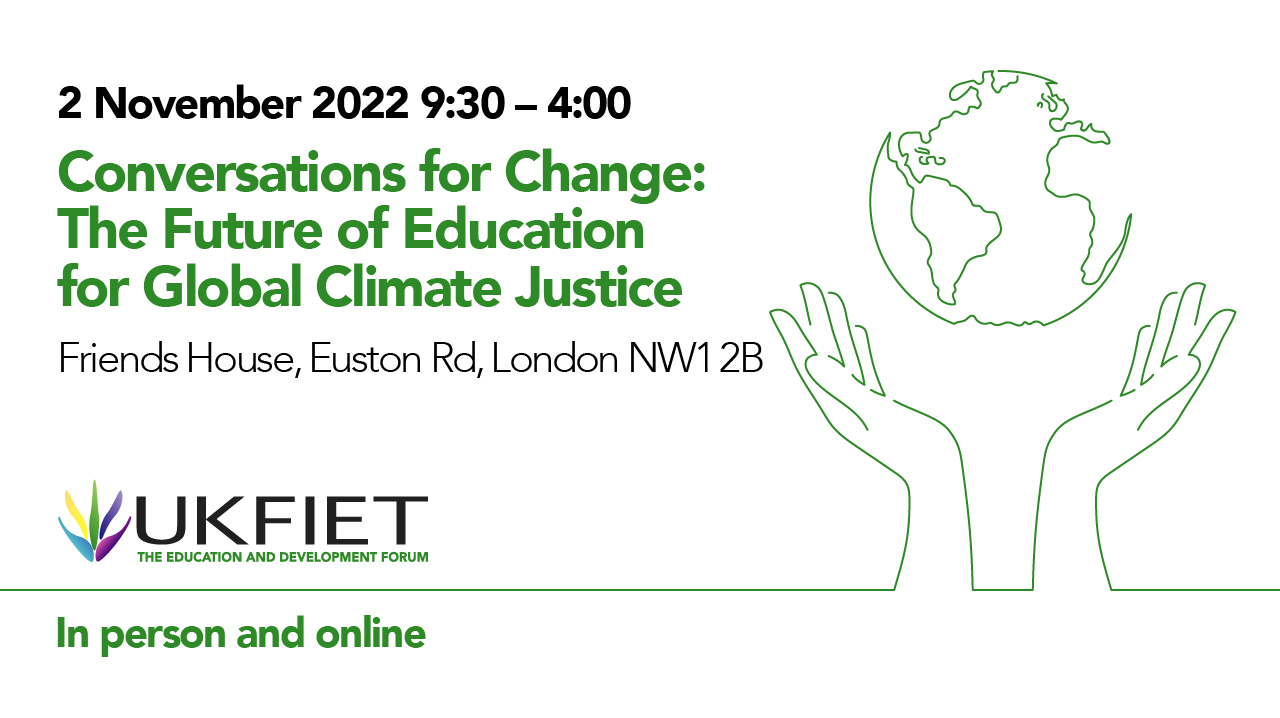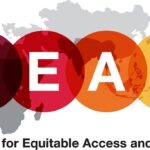
2 November 2022, 9:30 – 4:00 GMT
Join us for the day to engage in critical and forward-thinking conversation with activists, academics, educationalists, donors and policymakers, aimed at transforming education systems around the world for climate and environmental justice.
Friends House, Euston Road, London and Online.
The impact of human-induced climate change is being felt across the globe. It is leading to weather and climate extremes, and affecting human society and development – especially among global majorities who have contributed least to emissions.
In November, the latest UN Climate Change Conference of the Parties (COP27) will aim to accelerate action to minimise global warming. Such coordinated action is essential for disaster to be averted, and yet despite the growing profile the issue is given in political and policy discourse, there remain voices and communities that are not being heard. This raises the prospect that global efforts to tackle climate change will further entrench existing injustices and inequalities.
Education can help mitigate the impact of the climate crisis by enhancing climate literacy and promoting behaviour changes necessary to adapt to global warming and limit future global temperature rises. But what practical steps need to be taken to embed climate justice into education policy and programmes, curricula and pedagogy?
UKFIET is a membership body that brings together a wide range of UK-based professionals and organisations active in education and international development. It seeks to share ideas, convene conversations, and foster critical debate, and to do so in an inclusive manner. Join us to engage in critical and forward-thinking conversation with activists, academics, educationalists, donors and policymakers, aimed at transforming education systems around the world for climate and environmental justice.
Chaired by Professor Robert Beckford
Speakers include:
Professor Ganesh Singh
Professor of Curriculum and Evaluation at the Faculty of Education, Tribhuvan University, Kathmandu, Nepal. Professor Singh has over 18 years of experience in teaching, research and training. He has contributed in the several studies on assessment practices, in the Nepalese education system, involved as a program developer and radio serial scriptwriter in ‘enter-educate radio program for health workers’ for about five years. He has served as a consultant with bilateral and multilateral organizations including ADB, World Bank, UNESCO, UNDP, JICA/Nepal, CARE-Nepal etc. Currently, he is associated with critical thinking methodology development and implementation in Nepal.
Dr Kate Greer
Kate’s research explores environmental and climate change related education, and she is particularly interested in their connections with justice, and their positioning in policy. Her doctoral research examined England’s climate change education policy landscape using a Foucauldian theoretical lens. She has since been involved in an international research collaboration, the MECCE Project, which is using monitoring and evaluation to support policymakers enhance the quality and quantity of CCE globally, as well as research that is supporting educators in UK-based higher education institutions to respond to the environmental crisis through their teaching. Kate is currently a Research Fellow in the Centre for Climate Change and Sustainability Education at IOE, UCLs Faculty of Education. Kate previously worked in civil service and non-government organisations, and as a secondary school teacher in Australia and Southeast Asia.
Donvan Amenya: Donvan is an Education Specialist with expertise in research and programming within international development and humanitarian contexts. He is part of a core team at Education Development Trust leading climate education research work in Kenya and the wider region. Donvan is currently working on research looking at the intersect between social justice, education and climate events in different ecological zones throughout Kenya.
Panel 1: Climate activism:
Stories of action and change – aim to share some practical, positive examples of how climate justice is being achieved. To include stories/examples from the global south, including some which highlight the invisibility of such voices/issues within many current debates.
Panel 2: Education and environmental justice
Education is envisaged as a vehicle/mechanism that can help mitigate the impact of the climate crisis by enhancing climate literacy and promoting behaviour changes that are seen as necessary to adapt to global warming as well as to limit future global temperature rises. This panel will explore ways in which educational settings are currently doing this, and ideas about how this may be done. We will also explore whose voices and what perspectives are not being heard and why we are not always hearing from those most affected.
Workshop
Futures thinking for environmental justice in education
This session offers participants the opportunity to discuss environmental justice in relation to their own work and settings. We want participants to be aspirational as well as realistic in considering where they would like education to go and how to get there.
Phase I: Our utopian vision for schools and environmental justice
Phase II: Realising our vision
Final Session – Reflecting and linking – call to action
The event will take place in person at Friends House, Euston Road, London and on line. It will include plenary sessions and group workshops.
For those attending in person, refreshments and lunch will be provided.
The event will be in English
Register and join the conversation





